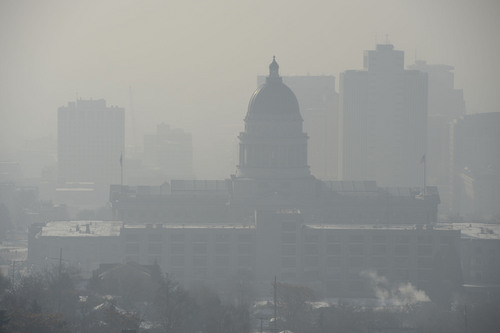This is an archived article that was published on sltrib.com in 2014, and information in the article may be outdated. It is provided only for personal research purposes and may not be reprinted.
There are about 20 bills floating around the Capitol to clean up Utah's air and many of them, says Senate Majority Whip Stuart Adams, will require money.
So Adams, R-Layton, plans to release a bill this week to create a $1-per-household surcharge on utility bills that would generate an estimated $18 million per year, dedicated to air-quality projects.
Adams said utility companies could request grants to build natural-gas-fueling stations or electric-charging terminals. School districts could seek loans to move to natural-gas-powered school buses. And cities and counties could request funding to help modernize their fleets to include cleaner cars and trucks.
Adams said Utah enjoys the lowest price for natural gas and electric power in the country, so his goal is to incentivize the move toward those cleaner fuels.
"If somehow we can make a conversion from an oil-based economy to a diverse fuel economy … instead of sending money to Saudi Arabia, we keep it in the state and help it grow and we clean up the air," he said. "The challenge is: How do we jump-start it? And in order to jump-start it, we need some revenue."
Low-income households or those who simply don't want to contribute to the fund could opt out of the surcharge, Adams said.
He would make the Utah Alternative Energy Resources Interlocal Entity, which was created by legislation he sponsored last year, responsible for administering the funds. It's made up of representatives from cities, counties, the state, the Legislature, the Utah Transit Authority, public schools and the natural gas and petroleum industries.
The alternative-energy board, in its annual report to the governor and the Legislature, said it needs a clear funding stream to help public entities convert fleets to alternative-fuel vehicles and asked the Legislature to consider finding a source. Adams' bill could provide that.
Claire Geddes, a longtime advocate on utility issues, said if lawmakers want to fund clean-air projects, they should do it with tax money instead of adding a fee to utility bills.
"They want to slap it onto our utility bills so they can say they didn't raise taxes," she said. "It seems horrible to stick that on and then expect people to opt out. … It's a sneaky way to do this."
She said the fee is regressive and those who are least able to pay it, like the elderly and others, would be hurt the most and probably the least likely to understand they can opt out.
Geddes also questioned the idea of turning so much money over to a board with little oversight or clear direction.
Twitter: @RobertGehrke



